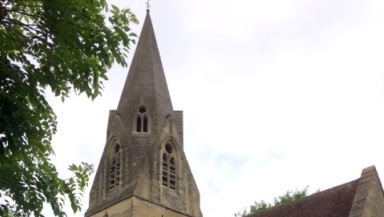Have you ever been part of a church community where passions about the building have run high?
Perhaps there was a plan to re-order it, or replace pews with chairs, or to do something else new – and immediately church members started to express really very strong views, maybe even falling out with one another. Or maybe a scheme to adapt the building sparked outrage or generated controversy in the local community, with the media getting involved. Many of us have probably had personal experience of this.

Well, the gospel is good news on this front – as it is in every area of life. For when we read about the ministry of Jesus in the New Testament we are led to the inevitable conclusion that buildings matter much less than we often think.
One of the key clues comes in some passing words we hear as we continue our fortnightly pilgrimage through Mark's gospel. Jesus has been arrested and hauled in to face the high priest, chief priests, elders and scribes (Mark 14:53). All sorts of accusations are being hurled at him.
And then Mark makes the interesting observation: 'Some stood up and gave false testimony against him, saying, "We heard him say, 'I will destroy this temple that is made with hands, and in three days I will build another, not made with hands'" (14: 57-58). Of course this would spark outrage among his hearers: the Jerusalem temple, the heart of life and worship – and Jesus is saying he will destroy it? Terrorism! Blasphemy!
As John makes clear in his gospel, in fact Jesus 'was speaking of the temple of his body' (John 2:21). And that's the point. With the coming of Christ, the whole notion of having a special building in which God was particularly present was about to become redundant.
The temple in Jerusalem was the place where God's presence was particularly manifest in the curtained-off section known as the Holy of Holies. When Jesus was crucified, as we shall see in future articles, that curtain was torn apart – symbolising the fact that access to God was now potentially open to anyone, anywhere, through Jesus' death.
Jesus describes his body as a 'temple' because it was the ultimate location where God and human beings encountered one another most fully. And, remarkably, the New Testament then goes on to describe the bodies of Christians as 'temples' (1 Corinthians 6:19) because the Holy Spirit of God lives in all who trust in Christ – making even us places where God and humanity interact. No longer is a special building (or special place within it) necessary.
What does this mean in practice?
1. Value people more than buildings. Church buildings are there to serve people, not the other way round. Buildings are not to become idols. Despite what we might instinctively think, God is no more specially present there than he is anywhere else. If you are a disciple of Christ, God is however specially present in you.
2. Remember that 'on Sunday, we don't go to church – rather, the church comes into the building'. This is a phrase that Glen Scrivener, the well-known Anglican minister and evangelist, has used and which is so helpful. It places these things in their proper perspective.
I write these things as Rector of three churches, all of which use buildings which are in part at least 1,000 years old. In many ways they are great and I love and cherish them. Many adaptations have been made to them over the centuries. But trying to do even quite simple things (like putting in a toilet) in today's culture involves vast amounts of bureaucracy and paperwork and the views of all sorts of interest groups.
A prayer which came up in the Church of England prayer cycle just a few days ago helps us remember that we as Christians are the building – the temple – that ultimately matters today: 'Almighty God, who built your Church upon the foundation of the apostles and prophets, with Jesus Christ himself as the chief cornerstone: so join us together in unity of spirit by their doctrine, that we may be made a holy temple acceptable to you; through Jesus Christ your Son our Lord, Amen.'
David Baker is a former daily newspaper journalist now working as an Anglican minister in Sussex, England. Find him on Twitter @Baker_David_A
The Rough Guide to Discipleship is a fortnightly series.













